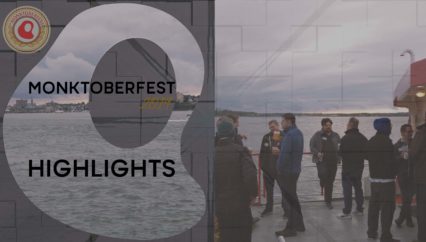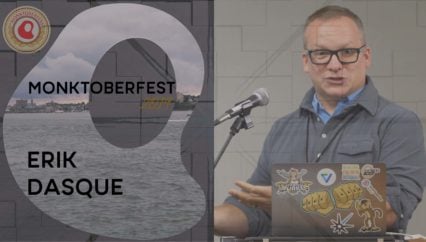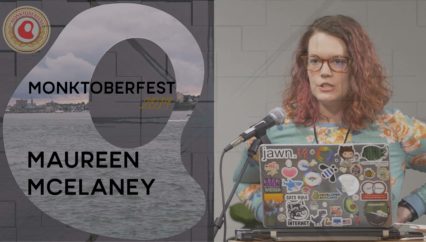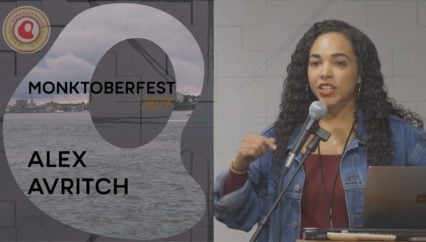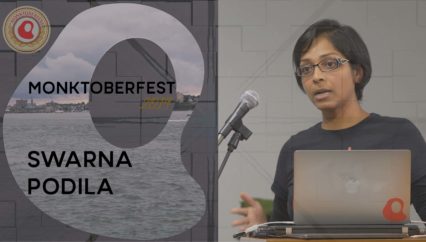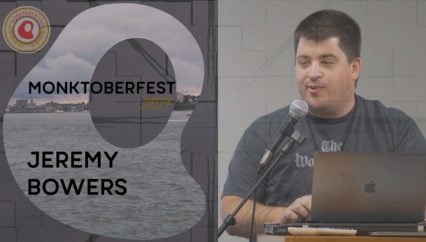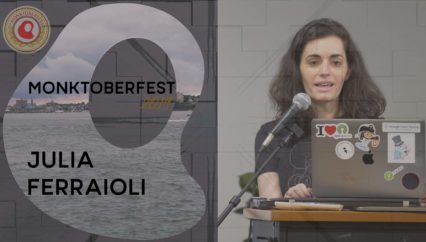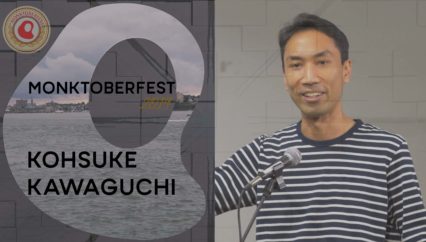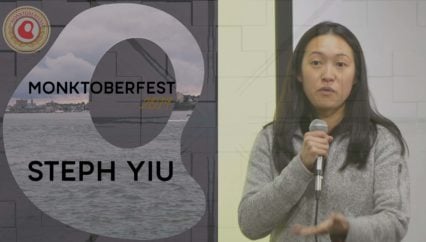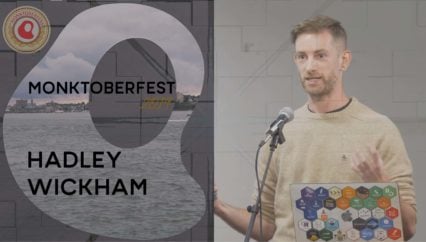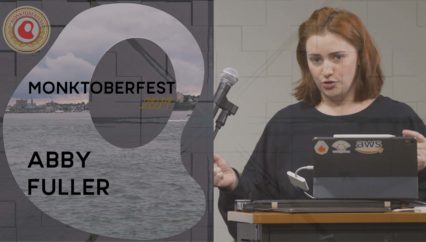Hey, everybody! So everything that Hadley just said, I feel seen as an academic, so as I’m not writing my dissertation right now, thanks so much, you know —
[laughter]
I appreciate that.
So last year was my first year at Monktoberfest, and I left super-excited, inspired, happy and motivated. And over the last year, I’ve become increasingly more frustrated, disappointed and enraged. Has nothing to do with James. Like, has nothing to do with James. Nothing to do with James this time!
But I left filled with hope believing in myself, you know, really thinking I could do it and the last year has made sure I realized I was wholly unable. However, there is a locus for my frustration.
[laughter]
Listen! I’ll be honest, when I agreed to do this, I came here to fight, right? I was like, I have earrings that come out really easily, I have vaseline in my bag. For those of you who don’t understand that, Google is your friend. But I’ve never been in a physical fight in my life, like —
[offstage direction to redirect the mic]
I’m usually really loud so this isn’t a problem. Is this better?
Yeah, so I’ve never been in a physical fight in my life, I know, seems odd, right? I talk real game, but I have literally never been in a fight in my life and the fear of incarceration made me manage my expectations, so Joe Emerson, I know you’re not here. Bring your Rainbow Brite fitted sheet and we’ll talk.
So as I mentioned I’m a PhD candidate, spent 12 years in and among the Department of Defense, spent some time in war zones, did some fun cool stuff and decided, no, I want to go back to school and be poor, right?
So I have a question for y’all, after high school how many of you went and got educated, whether it be trade school, college, whatever, how many of you went and got some sort of formal education? So of so you’ve got an education, right? You kind of got screwed, right? You really did. And I say this as someone who literally turned in packets to get a tenure-track position, I went through that hell. But you got screwed, because what you should have been doing is building knowledge, right? So just getting an education does nothing for you. You’ve got to gain knowledge over time. And I think some of you are kind of nodding and some of you are like, oh, what the hell is she talking about, like, what is she going to do for the rest of her life if she wants to be a professor, like, this is not going to work out well. It probably won’t, but you know, I got some options, right?
So there’s a difference. You get information. Like, in high school, they’re giving you information, they’re like, what year did this happen? What year did that happen? You know, my students I’ve been very fortunate, I have had 178 Tufts undergraduate students as both a teaching assistant and instructor of record. They are awesome, right? I love my miscreants, but they’re so focused on information. I want them to be able to think critically, to read critically and just leave in pain, because critical thinking and critical analysis is painful. But for them, they’re just like, tell me what I need to know, right? Just tell me what I need to know. They want the information. Information is easy, because it’s the words of a chapter, it’s the chapters of a book for y’all, some of y’all, I don’t do, like tech stuff, but it’s like the variables of the loop and then the loops of the function, you know, you know what I mean? It’s like, I guess.
[laughter]
Does that make sense kind of? Because it still doesn’t to me, don’t tell Matthew. We’ll get to that in a moment, right?
Information does not equal knowledge. You can have all the information in the world and be the least knowledgeable person under the sun, right? So knowledge is really the substance and knowledge is the story. So Erin Simpson is really big about talking about give me a hummable tune, give me something to leave with, tell me what to think about, make sure I know and I get the big idea, the context, the “so what.” That is what I want my students to understand. Everything has a story, and the foundation of those stories information. They have to have the information, but it’s just not enough, right?
So when I want them to gain knowledge, they need to know what it is. Knowledge is a function of information, discomfort, curiosity and motivation. Steve just talked about this, you want a safe space, but a safe space doesn’t equal a comfortable space, right? Those two things are very, very different.
I’m going to be like little geeky in a different way, not y’all’s way, but in a different way, right? But so like we’ve heard of mitochondria, right? 6th grade science class right? It’s the powerhouse of the cells, but that’s all we remember, or at least that’s all I remember. It’s kind of like we all remember ROYGBIV or Kingdom Phylum Class Family Order Genus Species. I have no idea what those are, but I can’t forget them to save my life. I’m taking my comprehensive exams and ask myself ‘what do I know?’ This has nothing to do with what I work on, but this is what comes to mind.
OK, so information is the powerhouse of knowledge, so much like mitochondria enable the body to create energy, information enables knowledge creation. But you don’t do that alone, you need these other things. It’s the interaction of information, discomfort, curiosity and motivation, right? So how do I get my students to knowledge? Because they don’t want to go. Because remember, they want the information. “Can I get the prompt? Can I get it ahead of time? I just want to know the question I have to answer.” That’s what they care about walking in the door. You call a function, right?
You see the blackbox thing, you guys for some of you who do developing, programming? Are those the same thing, actually? Like, are those synonymous, some people are like, oh, I’m a developer, and some people are like, oh, I’m a programmer, so I’m not sure if they’re synonymous, so that’s how I’m using. No disrespect so your community intended. I just do not know. I am ignorant about these things. So I have to give them the information and within that I have to set an environment in the classroom, in which discomfort, curiosity and motivation lead them to knowledge, right?
So motivation: What do they care about? Their grades, right? So that’s going to motivate them to do anything. So motivation for them isn’t necessarily the action. I just have to put a foot in their ass to get them there, right? Like, yeah, you don’t want to speak in class? Participation is 30% of your grade. You’re going to fail, right? That oral final — I know, that was mean, right? You have to sit down to talk to me me about I’m writing a dissertation on, and they’re like, “I don’t want to talk to you.” But in a final they rocked it out. They did great. But it was 30% of their grade. So you don’t do well, you’re gonna fail!
So then we talk about the safe spaces. I’m going to make you uncomfortable, right? So when one of my students happens to, we’re talking about war crimes and he says, he exceptionalizes American behavior, the United States. So I saw the look on her face coming a mile away. So the minute he said it, because I could tell where he was going, I just stood back and let them adjudicate that among themselves. I moderated but they’ve got to learn how to do that and in school the same thing that the student at Tufts gets caught by Tufts Police and gets taken to their dorm room for, the dude in Winter Hills is in front of a judge that Monday, right? School is the safest place possible. This school will protect you; this school will protect its brand. You don’t have to see a judge. There are limits to that, though, I try and tell them, there are limits, right?
And so curiosity, a lot of that comes from me, because they’re looking at me and they’re saying, hey, who’s this girl? Because you know, I have all the security bros, I study war and violence and they’re like, what does she know about them and I can see them coming a mile away, oh, “she’s a civilian, she’s a woman, she went to these fancy schools, what does she know?” I was like, OK, I got something for you, right? But that curiosity gets them in the room and then I can kind of break that down, right? So that’s what’s important. But that output, you get the input of information, all the function stuff is happening with all that thing, they’re just, you know, losing their minds for like the 13 weeks of the class and then the output is knowledge and that’s why that oral final. I can sit there and look at them and have a conversation and realize, OK, this may not be your strongest point, so let’s kind of take this conversation in this direction just slightly, and then they get it and they show me everything they know. They understand context, they understand contingency, but it may not be the same way that the static question would work for them, right? So let’s think about knowledge in practice, does anybody know what these photos are from in history?
[Audience: “The second one is the Amistice”]
Right, and the first is the Peace of Westphalia. My students can know, oh, Peace of Westphalia, that happened in 2648. I don’t care when it happened. I really don’t. I want you to know that what happened there set up the idea for sovereignty and the nation state system that we have for today. So in 1648 in The 30 Years War, that set up the nation-state system we have today, that this is the stuff that I geek out about. You guys have your own geek stuff, but this is what I care about, OK.
And this is the Treaty of Versailles and the hall of mirrors. How many of you have been to Versailles? Yeah, it still looks the same: old, big, beautiful, almost garish; Looks like a lot of Sadam Hussein’s castles? They’re built a little better than his were, but that being said, this marked the end of WWI, right? They know that, so they know on 28 June 1919, WWI officially ended because of this, but then when you ask them, “well, what did that mean? Why was that so important?” This is what pissed Germany the hell off. Right? And I’m not saying it’s causal. It did not cause World War II. But it is highly correlated with how Germany behaved, right? Wouldn’t you be pissed if you had to take responsibility entirely for World War I which they didn’t think they were going to do when they walked in the door. They had to pay reparations that were so high that the last payment was in 2010. And they lost territory, their military had to be downsized, all these things.
So when you’re walking at those years between that inner war period, all you’re doing is fomenting anger. That happened here. That’s what I want them to know. On an exam if they never gave me that date, I wouldn’t care, but if they could tell me everything I just told you and give me that argument, I have given them knowledge and that’s what matters. If they leave my classroom and they’re like, “I just have so many questions” — because they’re very dramatic. I just — “oh, my gosh, I just don’t know,” right? It’s like great, it’s wonderful. I love them. Like they’re comedy for free. If you can’t do anything, teach, like, literally, teach, because they are wonderful and the things they get these existential crises over you’re like, you have to take them seriously, but you just know you’re going to be OK, right? You’re going to be all right. So those are the things that when you start talking about putting knowledge into practice, it’s not these dates. It’s not what these are, it’s what they meant. It’s it’s the context, the contingency, that’s what matters.
But what about me? What do I do?
Two years ago, you could not have told me that my story, which is my dissertation, would run through Tufts lacrosse, right? Sorry. But you knew it was coming, right? These are — I know, these are four of my students. I for some reason picked up Tufts lacrosse players as students left and right as a teaching assistant, and as a teacher instructor of record. Here’s what’s interesting.
I didn’t favor them. I’m kind of not nice to my students. I’m really hard on them. When I see them walking towards me on campus, I’ll be like, what do you want? Nothing, I just want to say hi, no, no, no you have something in your eye. OK, I just need a recommendation. Like, it always comes to that no, I can see this in your eye, right? So one thing I want you to note about this photo, have you ever seen a photo of a black woman with four white men and she has the least interesting hair?
[laughter]
[applause]
Like, honestly, the — I looked at this photo and the first thing I noticed was like, Johnny, his tease to Jesus hair over here, it’s a bouffant, how many of you have seen Steel Magnolias? This is something that would happen in Trudy’s shop, right? Danny who is to my right is covering up his mullet, right? He is now the assistant coach of Tufts lacrosse. Henry has this very stylish ‘I’m from California’ do, right? And then Stewart at the end, and that smirk, when that walked into my classroom, I was like, whoo we’re going to have problems right? But you know, these four invited me come watch them play by saying, “you’ll love how we play, Meg, we beat the hell out of people.”
I didn’t know what that meant about me or them, because I’d never seen a lacrosse game live, and when I tell people I’ve become a lacrosse fan they’re like, you know, Jim Brown played lacrosse, he’s the one black person they know who played lacrosse. He played at Syracuse, so it’s been a while, right? I of course showed up with a tablet, thinking oh, when they huddle, you know, I can get some work done. They don’t dough that. I didn’t know so I went and watched what began my history of watching white on white crime.
[laughter]
Happened, like, two times a week every spring, right?
So you know, I needed, but for my own research, I realized I needed help, right? So I had to assemble all my squad. Remember Stewart, the smirk, this is actually a smile for him. Right now this looks like a poster for orthodontia. I’m not saying I’m a causal mechanism, but it’s highly correlated with being one of my research assistants and being a captain of the Tufts lacrosse team, because Stewart was one last year and Matthew is one this upcoming season. So if this is what you want, it’s a good thing to start with. So Stewart is the one who, he is half Mexican, I know, doesn’t look it, right, but he speaks Spanish and one of my case studies is El Salvador Civil War, and so he was doing qualitative stuff, Matthew is the one who was teaching me Python. We’re going to get to that horror, because this is really a story about the teacher becoming a student with Matthew, and how ugly that was.
Let’s first start with Stewart. This is a story of four smirks, right?
It’s like everyone — and so the one second from your left is the senior one and so I was like, Stewart, buddy, come on, you can do it, you just smile like a normal human being, you can do it and he said this was his best attempt. I love him, but this — I just had to say this, and if anybody’s seen Dead Poet’s Society and remembers Knox Overstreet, this is kind of who Stewart reminds me of.
And then I went to Matthew. And I said, hey, I want to learn Python. I know my personality is not for everyone. But I thought he could handle it. And we had our first session and he brought in this work plan and I was like, you mean a syllabus? And I looked through it and it seemed really detailed. And I said I just want to learn how to do this for the stuff I do. Which is like social scientists do. You probably know this with R, Hadley, that “I just know how to do these 4 things, and if something goes wrong I’m screwed because I don’t know what underlies that.” This is political science at it’s finest. I’m like I just want to know how to do the things I do. And this kid, 20 years old at the time, looked at me in the eye and said, you might want to find someone else, because you need to know the basics of coding.
[laughter]
Yeah. That’s not how people respond to me, usually, and not a 20-year-old dude, like, right? And he looks like a scruffy extra from Dead Poet’s Society, but you know, so in that moment, though, I realized I’d made the right choice. I needed somebody who would stand up to me, because I need strong leadership. Let’s just be honest. I know this, other people know this, right?
All right, so then I started to learn to code. So we come back to the blackbox, right, sort of situation. This was like the first couple of weeks and I’m like, I don’t know what I’m doing. That could be written here, as well, right?
And so we met in the same room, and they should name this for us, I call it Hell in a Cell, this was a place of precision, of right and wrong, of no random extra spaces. I’m a social scientist. Right? I don’t live in a binary world. I live in a world of alternative explanations, of different definitions, things like that.
That doesn’t work in y’all’s world for the most part. Like, I never knew a space at the end of a sentence would cause me hours of agony.
[laughter]
Like, it was so painful., right? Like, there are no rights and wrong in my world, there are just strong and weak arguments, right? Apparently that’s not how y’all get down, right?
So I will say this, it was hard. It was humbling. And so I needed some humility and grace, because I am a horrible student. I don’t do my homework. I make excuses. And I’ve tried every tactic possible in work avoidance. I whine, I complain, y’all, one day I literally did the fake cry thing, and —
[laughter]
And like he looked at me, like, dead in the eye, yet again because he has no problem doing that and said, when you’re done I’ll be over here.
[laughter]
I was so — and but much like trying to fold the fitted sheet, I get frustrated, I get disappointed, I get angry, and we just keep going. Right? Because I’m trying to find knowledge. Doing the best I can. And sometimes I suck at it. The only thing I won’t do is I won’t lie to him but I’ll do anything up to that point. But I have strong leadership. I’m really fortunate, right?
And so he understands me very well.
This is what I needed. Like I didn’t think I needed it, but this is what I needed. I needed my own personal hype crew. I needed my teacher, right? I needed him to help me get to knowledge, and this is something like that means the world to me. Out of a now 21-year-old, I’ll give him his year, he’s about to turn 22. This is what I needed and that might seem really weird for somebody who’s 40 years old and you know, but I’m learning. It’s a process. I’m learning knowledge.
And so for him, this is what matters. And I worry at times that I push him too much and he’s going to quit, which is like my biggest thing, because I’m like, how can I say a 21-year-old quit on me from something I did, because it would be something I did, it really would. But he believes in me more than I believe in myself, I’ll say that, to learn this stuff, to be able to do my quant research. So I worry that I push him too far, but let’s see if this work. Will it work? Yeah, it’s just going to be a little slow. I was at this game and saw this and it’s not showing up. Hm.
Let me do this …
Oh, it’s not showing up. I feel bad, because I had something really special for you. Let’s see if we can actually — no, no, no, I mean we do. Here’s what’s interesting. I grew up in the Midwest. I grew up in rural Kansas, and I grew up in a place where you never show up without a gift for the host. You never show up without a gift for the host, so let me see if I can get this to actually work. Rachel, are you around? Because I think this is a really special moment. Does anybody want to come up here and help me with this? Because I just — I think it’s really important that you see this.
>> So this is what should not happen is a goalie be able to take a — I don’t know much about lacrosse, right, but this I do know is that a goalie should not be able to make a save and then go on to the end of the other side in a NESCAC championship game in the last quarter when you are down by one, to tie the score, your goalie should not become a shooter and this is one of my favorite students in the world, Mason Pawlack, and he was able to do this against your dear alma mater. And so I just, this is my gift to you. Thank you.
[laughter]
>> Thank you all so very much.
[applause]
